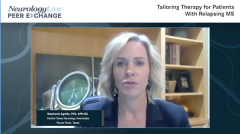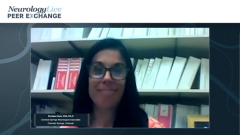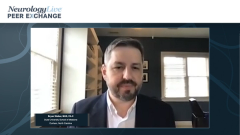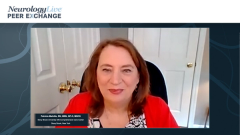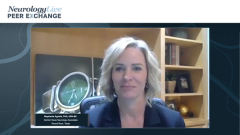
Looking Ahead at Managing MS
An optimistic look at the future management of multiple sclerosis (MS) based on newer treatment options and ongoing research in the field.
Episodes in this series

Transcript:
Amy Perrin Ross, APN, MSN, CNRN, MSCN:We’re going to close up with our final segment about looking ahead, and I’ll ask each of you to take out your crystal ball and think about what the future looks like with MS [multiple sclerosis]. I know none of us can predict that, but what do you see that’s most eminent, or perhaps what do you hope is most eminent in life with MS these days? I’ll start with Stephanie.
Stephanie Agrella, PhD, APN-BC: Sure, Amy. Thank you. The future is looking bright. We have so much research that’s been done just in MS over the past 25 years or more. It’s brought us 19 different therapies. We have a variety of different administration options. We have a variety of different mechanisms of actions that we can provide to our patients. As more research happens in the field—specifically looking at those biomarkers, remyelination, neuronal repair, and neurofilament light chains—these are going to help us expand our knowledge base, likely expand our treatment options, and ultimately benefit our patients’ outcomes.
Amy Perrin Ross, APN, MSN, CNRN, MSCN:Great.How about you, Bryan?
Bryan Walker, MHS, PA-C: As usual, I agree with Stephanie. We’re going to be borrowing from other areas as well when we look at other demyelinating disorders. We’re going to look at the importance of the complement cascade. We’re going to be rehashing some of the old and maybe tweaking some of what we have now. And we’re going to be looking at what some of the other possible interventions are that could take us to the next step. We’ve seen an explosion in our disease-modifying therapies [DMTs] and our options for treatments for patients over the past 5 years. That’s going to be logarithmic over the next 5 years.
Amy Perrin Ross, APN, MSN, CNRN, MSCN:Great.Kristen?
Christen Kutz, PhD, PA-C: I agree with what everyone said. The future is bright. I hope we learn more about what causes MS and have more of an understanding of the pathophysiology. The treatment options just keep coming. There’s remyelination trials going on and BTK [Bruton tyrosine kinase] inhibitors. I just went to a conference yesterday about cell-based therapies. There are many new exciting things that hopefully we can offer our patients with MS soon.
Amy Perrin Ross, APN, MSN, CNRN, MSCN:Indeed. Pat?
Patricia Melville, RN, MSN, NP-C, MSCN: I agree with everything that everybody said. I feel optimistic for the future. The areas that we need to work on are the areas that everybody said. Remyelination, that will be a bone to our patients. Everybody is eagerly awaiting that and developing more treatments for progressive MS. We have relapsing MS down at this point, we know how to treat it. We have so many choices for therapies. Hopefully when we develop biomarkers, we’ll be able to individualize our therapies for our patients. But we still have a bit of time to go for our progressive patients.
Amy Perrin Ross, APN, MSN, CNRN, MSCN:Thank you. In my own view, I’m hoping for prevention of damage. Once we identify that the cascade has started, what can we do beyond our current DMTs to hold the disease in its tracks? People are always talking about remyelination and how important that is. I agree that it is, but if you about the fact that if we let axonal transection continue to progress, what are we going to remyelinate? My hope is that we move along the continuum somewhere in the concept of prevention and what we can do to at least stop this disease in its tracks, if not reversing things, with respect to the future. That offers a great deal of opportunity for hope for patients, and that’s incumbent upon us.
Thank you all so much. I would like to thank this wonderful panel, Christen Kutz, Stephanie Agrella, Bryan Walker, and Patricia Melville for this wonderful discussion. I’d like to thank you, as an audience, for watching Neurology Live® Peer Exchange. If you enjoyed the content, I suggest that you subscribe to the Neurology Live® newsletters to receive information about upcoming Peer Exchange segments and other content available to you. Thank you all so much.
Transcript edited for clarity.
Newsletter
Keep your finger on the pulse of neurology—subscribe to NeurologyLive for expert interviews, new data, and breakthrough treatment updates.

